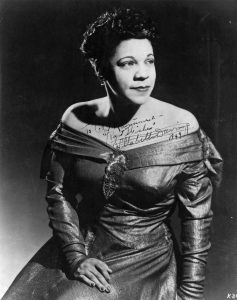Podcast: Play in new window | Download (Duration: 1:10:27 — 81.4MB) | Embed
Subscribe: Spotify | TuneIn | RSS | More
Today I present the African American soprano Ellabelle Davis (1907-1960) who during the late 1940s and early 1950s was greatly celebrated as a concert singer and who appeared around the world, the “Toast of Three Continents” as an early Musical America ad featuring the soprano proclaimed. She even appeared on the operatic stage, primarily as Aida, though her artistry was best suited to the concert platform. Additionally and unusually for the time, she made a number of recordings, including two 10-inch LPs for London-Decca records in 1950. During my research into Ellabelle Davis, I discovered that she had made a second series of recordings, a group of 78s for the Philips record company. I had assumed that, because of their format, these were earlier recordings, but upon further research, I found that these were recorded in 1952 with the Danish pianist Kjell Olsson (1917-1997) at the time of her final tour of Denmark. And to my surprise and delight, these included not only two sides of French art song, but also a disc of spirituals which she did not record elsewhere, and even the Brahms Zigeunerlieder, long a staple of her concert programs. In her day she was frequently written up in the New York Times and appeared repeatedly in high-profile concert appearances in the city, and even moreso, around the world. Yet her career was slowed by illness, and she died prematurely at the age of 53 of cancer, after attempting a career comeback the previous year. I present a number of her extant studio recordings and attempt to place her career within the context of larger social issues in the United States (and around the world) at that time, including considering why artists like Dorothy Maynor, Marian Anderson, and Davis herself, heavily promoted by the mainstream and celebrated for their modesty and dignity (always coded language!), were a more palatable counterpart for white audiences to more progressively-minded artists like Paul Robeson
Countermelody is a podcast devoted to the glory and the power of the human voice raised in song. Singer and vocal aficionado Daniel Gundlach explores great singers of the past and present focusing in particular on those who are less well-remembered today than they should be. Daniel’s lifetime in music as a professional countertenor, pianist, vocal coach, voice teacher, and journalist yields an exciting array of anecdotes, impressions, and “inside stories.” At Countermelody’s core is the celebration of great singers of all stripes, their instruments, and the connection they make to the words they sing. By clicking on the following link (https://linktr.ee/CountermelodyPodcast) you can find the dedicated Countermelody website which contains additional content including artist photos and episode setlists. The link will also take you to Countermelody’s Patreon page, where you can pledge your monthly or yearly support at whatever level you can afford.


